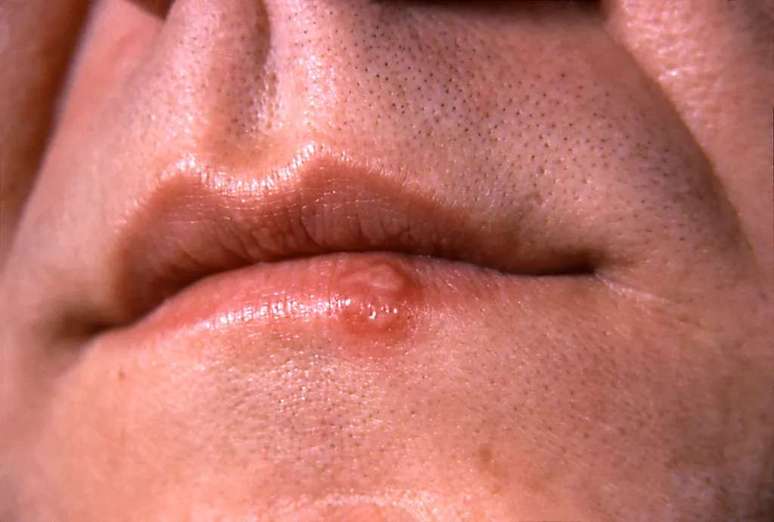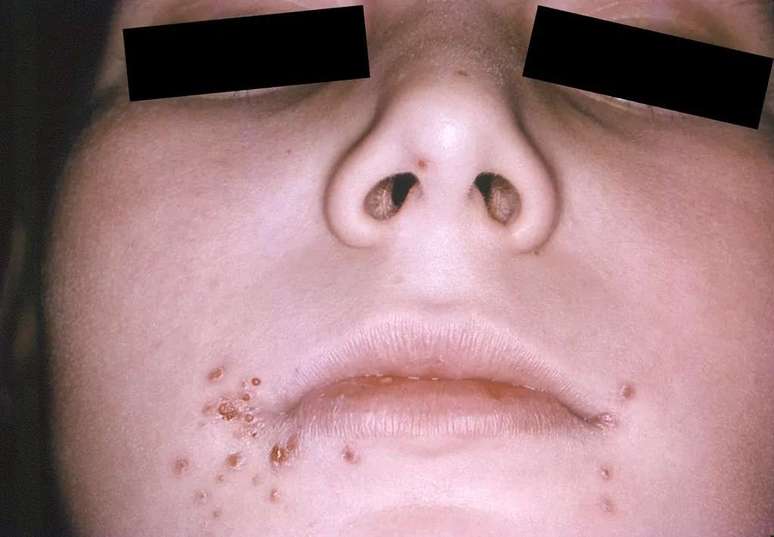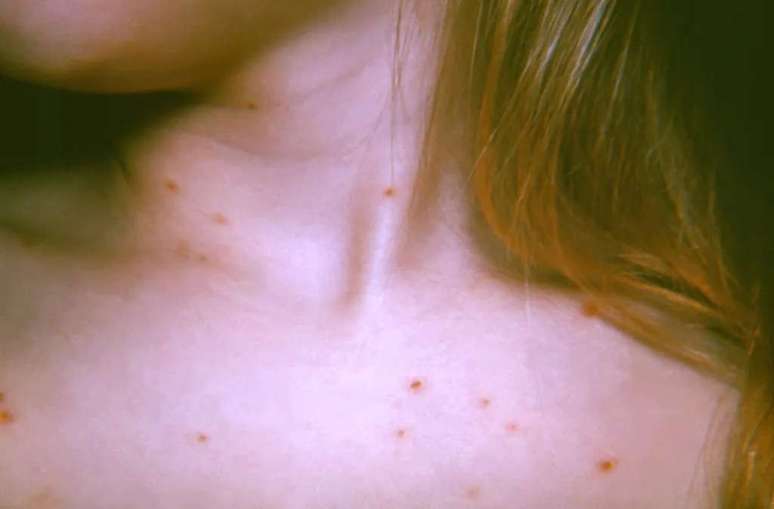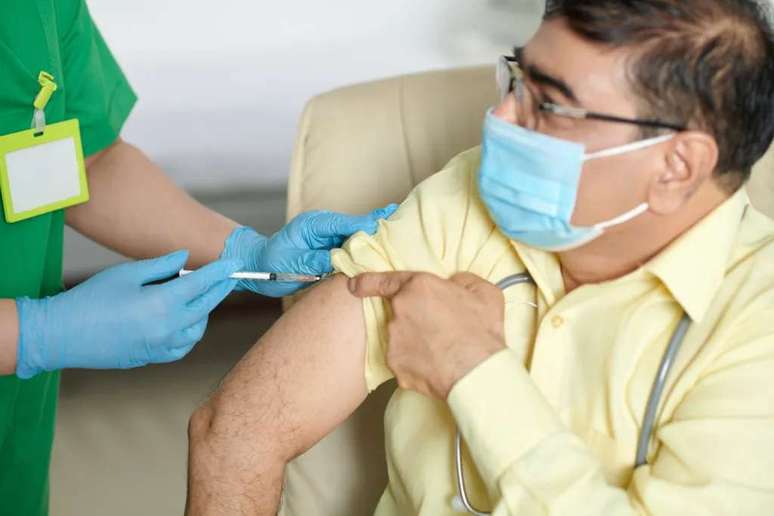People who have herpes mouth sores can pass the virus to other people through kissing. The alert is important for the carnival season
Herpes – the name given to the virus that causes lesions all over the body, such as in the mouth and genitals – has several forms of transmission. One of these occurs through kissing, and this occurs when the infected person is in the acute phase of the disease, a phase characterized by sores on the lips that last 5 to 10 days. During Carnival and festivities, it is necessary to pay attention to the risk before exposing yourself to possible risks, since it is common to see many people kissing not just one mouth, but several mouths, especially strangers. Sharing cups and other personal utensils can also transmit the infectious agent.
- Doctors use herpes virus to treat cancer, amazing results
- The ‘kissing disease’ virus can cause multiple sclerosis, according to a study
In addition to cold sores, Carnival season is often associated with an increase in diseases transmitted through kissing. Among them, the most common is the kissing disease itself, officially known as mononucleosis. Thrush (oral thrush) e syphilis can also be transmitted by this type of contact.
| Attention! Those who have been diagnosed with herpes should not kiss and let other people come into contact with their sores in the acute stage of the disease. The same recommendation applies to other diseases that can be transmitted by kissing. |
What kind of herpes is transmitted by kissing?
It is worth explaining that herpes is one of the most common sexually transmitted infections (STIs) in the world. And what we know generically as “herpes” can be caused by two different viruses from the same family:
- Cold or oral herpes: officially known as Herpes Simplex Virus Type 1 (HSV-1);
- Genital herpes: called Herpes Simplex Virus Type 2 (HSV-2).
As the name suggests, oral herpes is most often transmitted by kissing. Now, genital herpes is often transmitted through vaginal, anal or oral sex. This is the rule, but some exceptions can occur, especially when it comes to oral sex. In such cases, contamination may be the opposite of the rule. In other words, genital herpes can occur in the mouth and vice versa.
Does the type of kissing matter for herpes transmission?
In fact, the kind of kiss a person with herpes gives — when they have sores on their lips — matters little for transmission. This is because both a French kiss and a kiss can transmit the virus, depending on the circumstances.
After all, herpes is transmitted by contact between the wound or its secretions and a healthy mucous membrane. Therefore, secretions from the vagina, penis or anus and oral fluids (saliva) from an infected person can also transmit the disease, according to an article from the Faculty of Medical Sciences (FCM) of the State University of Campinas (Unicamp).
When is the risk of herpes transmission greatest?

Before blisters and sores form on the lip, the person usually feels some warning signs, such as stinging, stinging and itching in the region where they blister. Even if the lesion is not yet visible at this stage, it is not advisable to kiss a person, for example.
After the first signs, it is normal for small blisters to appear in a group on a certain area, which is usually red and swollen. Then they rupture and release pus, which forms small sores. This is the stage where the disease is most transmissible. In medicine, the stage is called the acute phase.
Naturally or hastened by antiviral treatment, the wounds begin to dry out and a scab forms in place of the bruises. The whole process takes up to 10 days. Although herpes is more easily transmitted when the sores are open, the infection can also be transmitted by asymptomatic people.
Do not share cups and cutlery in the acute phase of the disease
During outbreaks it is important to avoid sharing cups, cutlery and other items that have come into contact with the saliva of a person carrying the virus. However, herpes is very unlikely to be spread from toilet seats, swimming pools, bathrooms, hot tubs, or damp towels. This is because the life of the virus outside the body is quite short.

Additionally, it is possible that an infected mother could pass the virus to her baby during or after delivery if proper care is not taken. When transmission occurs, these cases are known as neonatal herpes.
Is herpes infection curable?
So far, science has not found a cure for oral or genital herpes. This means that the person will remain with the virus for life, but more often than not it must remain latent, i.e. the wounds will not always be visible – only at specific times, when the immune system is already weakened.
“After the first outbreak, the virus moves from skin cells to nerve cells. The virus stays in nerve cells forever,” explains an article from the American Academy of Dermatology Association (Aada).
According to Aada experts, the following factors can “awaken” the latent herpes virus:
- Fatigue;
- Illness;
- Fever;
- Prolonged exposure to the sun;
- Menstrual periods;
- Surgical interventions.
herpes treatment
While wound healing is natural, specific treatments can speed up the healing process, relieve symptoms, and prevent scarring. In these cases, the use of antiviral drugs, which can be ointments or lozenges, is indicated, as prescribed by the doctor in charge of the case.

After all, is herpes a common virus in the world?
The World Health Organization (WHO) estimates that 3.7 billion people live with oral herpes. As a percentage, this means that around 66.6% of the world’s population up to the age of 49 are carriers of the virus. In the case of genital herpes, the disease affects 491.5 million people aged between 15 and 49, equal to 13.2% of the world’s population in this age group.
“Herpes infection affects millions of people around the world and can have far-reaching health effects. We need more investment and commitment to develop better treatment and prevention tools for this infection,” explains Sami Gottlieb, Ph.D. ‘WHO is one of the authors of the study which estimated the number of global cases of herpes.
Are there other types of herpes other than kissing?

In addition to oral (HSV-1) and genital (HSV-2) herpes, there is a third type of infectious agent: the HHV-3 virus, also known as Varicella-Zoster virus (VZV) or Herpes Zoster Virus (HZV). Both chicken pox and shingles are caused by this third type.
However, chicken pox (varicella) is the acute and primary stage of infection by the virus, i.e. it appears the first time the organism comes into contact with HZV. Thus, the infectious agent enters a latent stage and can eventually manifest itself. In these cases, the disease is called shingles, also known as shingles.
If the virus reaches the facial nerves, it can be triggered Ramsay Hunt Syndrome, which became wildly popular after singer Justin Bieber shared his diagnosis last year. Due to her condition, the star developed facial paralysis, she had problems with vertigo and had to cancel the concert schedule.
Prevention of herpes-like viruses

To avoid all possible complications, there is a shingles vaccine on the private market, available for people aged 50 and over. In the case of chickenpox, the vaccine is distributed free of charge in the Unified Health System (SUS) for children. There is currently no specific vaccine against cold sores and genital herpes.
Source: Ministry of Health, Health line, WHO AND AADA extension
Trending on Canaltech:
- GM Confirms New Montana Pricing; see how much each version costs
- What are the largest gold nuggets ever discovered in Brazil and in the world?
- How anxiety affects different parts of your body
- Scar | The Lion King villain is getting a comic
- 10 best-selling pickup trucks in Brazil in January 2023
- Anvisa bans multiple brands of hair pomades, bringing the total to 27
Source: Terra
Rose James is a Gossipify movie and series reviewer known for her in-depth analysis and unique perspective on the latest releases. With a background in film studies, she provides engaging and informative reviews, and keeps readers up to date with industry trends and emerging talents.








